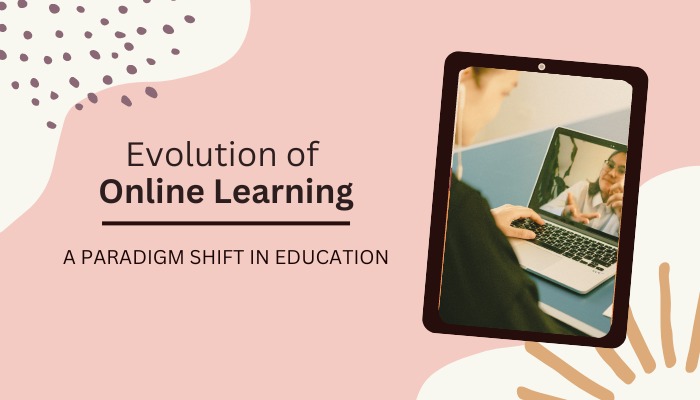The Evolution of Online Learning: A Paradigm Shift in Education
In recent years, the world has witnessed a transformative shift in the way education is imparted and acquired. Online learning, also known as e-learning or distance learning, has emerged as a game-changer, revolutionizing the traditional educational landscape.
In recent years, the world has witnessed a transformative shift in the way education is imparted and acquired. Online learning, also known as e-learning or distance learning, has emerged as a game-changer, revolutionizing the traditional educational landscape. With technological advancements and a growing demand for flexible and accessible education, online learning has gained prominence across the globe. In this article, we will explore the multifaceted aspects of online learning, its advantages, challenges, and its impact on shaping the future of education.

Accessibility and Flexibility:
One of the primary benefits of online learning is its accessibility and flexibility. Learners can access course materials, lectures, and assignments from anywhere at any time, breaking the barriers of physical location and time constraints. This flexibility allows individuals to pursue education while balancing work, family, and other commitments, making learning more inclusive and empowering.
Diverse Learning Options:
Online learning provides a wide range of courses and programs that cater to diverse interests and professions. From academic degrees to skill-based certifications, learners can choose from a vast array of subjects and customize their learning journey according to their goals and interests. This diversity enables individuals to acquire specialized knowledge and skills, enhancing their employability and career prospects.
Personalized Learning Experience:
Thanks to adaptive learning technologies and personalized learning platforms, online education offers tailored experiences to individual learners. Through data analytics and artificial intelligence, online courses can assess learners' strengths and weaknesses, recommending relevant content and pacing the curriculum accordingly. This individualized approach fosters better engagement and ensures effective learning outcomes.
Cost-Effectiveness:
Compared to traditional brick-and-mortar education, online learning is often more cost-effective. Eliminating the need for physical infrastructure and reducing administrative expenses allows educational institutions to offer courses at lower prices. Additionally, learners save on commuting and accommodation expenses, making education more affordable and accessible to a broader population.
Global Learning Community:
Online learning transcends borders and connects learners from all corners of the world. This global learning community encourages diverse perspectives, cultural exchanges, and collaborative problem-solving. Students can engage with peers and instructors from different backgrounds, broadening their horizons and preparing them to thrive in a globalized world.
Continuous Skill Upgradation:
The rapidly changing job market demands constant upgradation of skills. Online learning enables professionals to stay relevant by pursuing short-term courses and micro-credentials. Continuous skill development ensures that individuals can adapt to evolving job requirements, fostering a culture of lifelong learning.
Challenges of Online Learning:
While online learning brings numerous advantages, it also faces some challenges. Technical issues, such as internet connectivity problems and platform compatibility, can hinder the learning experience. Moreover, the lack of face-to-face interaction may lead to feelings of isolation and reduce social engagement, impacting the overall learning process.
Ensuring Quality and Credibility:
As the popularity of online learning grows, ensuring the quality and credibility of courses becomes paramount. Institutions and learners need to verify the accreditation and reputation of online education providers to avoid falling prey to substandard programs.
Conclusion:
Online learning has undeniably transformed the way we approach education. Its accessibility, flexibility, and personalized learning experiences have made knowledge dissemination more inclusive and efficient. As the world continues to embrace technology, online learning will undoubtedly play a pivotal role in shaping the future of education, empowering learners to thrive in a dynamic and interconnected world. However, it is essential to address challenges and maintain quality standards to harness the full potential of this revolutionary learning paradigm.
